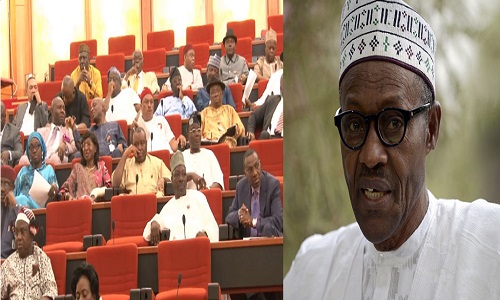The crisis between President Muhammadu Buhari and the National Assembly over the 2018 budget is gradually revealing certain hidden anti-people policies of the federal government. The National Assembly in response to President Buhari’s caustic criticism on the legislature over unilateral alteration of the budget and delay in the passage of the Appropriation Bill, accused the president of non-implementation of 2016 and 2017 budgetary allocations for the Second Niger Bridge.
The Federal Lawmakers in a 12-page statement titled: ‘The President’s Budget Speech: Our Response”, signed by the Chairman, Senate Committee on Media and Public Affairs, Senator Aliyu Sabi Abdullah; and Chairman, House of Representatives Committee on Media and Public Affairs, Honourable Abdulrazak Namdas, last Friday emphasized on the issue of the Second Niger Bridge project, that “apart from early works, as of today, there is no existing contract for the Second Niger Bridge in spite of frequent requests from the National Assembly.” They maintained that the N900 million reduced from the N10 billion proposed by the Executive was deployed to fund ancillary roads that connect to the Bridge, reiterating that the executive did not utilize the two years total of N20 billion budgetary allocations for the Second Niger Bridge contained in the 2016 and 2017 Appropriation Acts.
“It should, again, be noted that the N12.5 billion and the N7.5 billion appropriated for the Second Niger Bridge in the 2016 and 2017 budgets by the National Assembly were never utilized for the project,” the lawmakers declared.
The lawmakers observed that the executive is responsible for the prolonged period between when the budget proposal was submitted and when it was passed by the National Assembly.
“it is necessary to remind Nigerians that although the budget was submitted in November, as at March 15th, 2018 (five months and eight days after the budget submission), Mr. President was still directing the Secretary to the Government of the Federation to compel the Heads of Ministries, Departments and Agencies of the Federal Government to appear before the committees of the National Assembly to defend their respective budget.
“In addition, up till April (six months after the budget submission), the Executive was still bringing new additions to the 2018 budget which the National Assembly, in good faith and in the spirit of collaboration and harmonious working relationship, accepted,” the federal lawmakers declared.
The National Assembly further argued that, “more importantly, the 2017 budget, was signed into law on June 5th, 2017 and by the provisions of Section 318 of the Constitution, which defines the Financial Year as “any period of 12 months beginning on the first day of January in any year, or other date as the National Assembly may prescribe” – the 2017 budget lapsed on the 5th of June 2018. This same provision is replicated in the 2017 Appropriation Act.”
The lawmakers, again, argued that “It is important to also note that if not for the fact that the 2017 budget elapsed on the 5th of June 2018, the Federal Government would not have recorded notable capital projects for the just-ended financial year.
“This is because the Federal Government only started releasing funds for capital projects in December 2017 when the funds from the Federal Government’s loans were released and disbursed to contractors.”
The National Assembly acknowledged that on the issue of an Organic Budget Law to improve the budgetary process, the proposed law is pending in the National Assembly, remarking that it cannot be considered without the amendment of Section 81 of the 1999 Constitution (as amended) which gives the President the power to propose “estimates” at any time in the financial year.
The lawmakers revealed that Nigerians need to know that during the last Constitutional Review exercise, the National Assembly, in its wisdom, amended this provision which was approved by over two-thirds of the State Houses of Assembly. They contended that the new Constitution Amendment requires the President to submit the budget not later than 90 days to the end of the financial year; lamenting: “As of today, the President has not yet signed this Constitutional Amendment Bill which would have helped us to have a proper budget calendar, which shall eventually lead to the realization of the proposed January to December budget cycle.”

 Football6 days ago
Football6 days ago
 Health & Fitness15 hours ago
Health & Fitness15 hours ago
 Aviation1 week ago
Aviation1 week ago
 Featured4 days ago
Featured4 days ago
 Comments and Issues6 days ago
Comments and Issues6 days ago
 Education5 days ago
Education5 days ago
 Business5 days ago
Business5 days ago
 Education1 week ago
Education1 week ago

